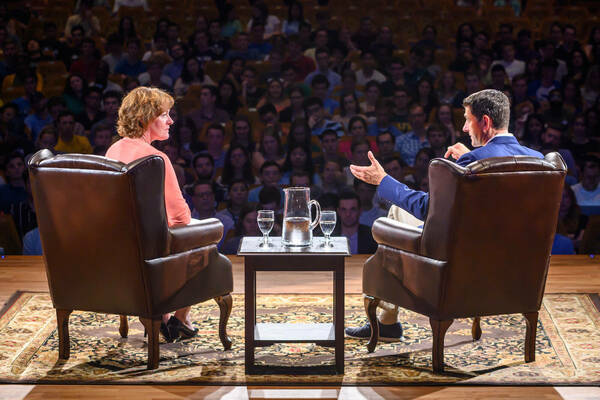A core part of Notre Dame’s mission is to “create a sense of human solidarity and a concern for the common good,” and there is no better embodiment of this principle than the Wilson Sheehan Lab for Economic Opportunities (LEO). Notre Dame’s mission further states that the University has a “responsibility to advance knowledge in a search for truth” and over the past decade, LEO has capably shouldered this heavy responsibility by advancing poverty-fighting strategies rooted in evidence and designed to actually help people who are in-need.
In today’s polarized age, LEO’s use of data and research to combat poverty has become more important than ever. And as the laboratory celebrates 10 years of advancing policies and solutions that help people realize their version of the American Dream, it’s important to take stock of their approach and why it matters.

As a legislator in Congress, I was appalled and frankly surprised at the dearth of non-partisan research and the lack of basic evidence when it came to measuring the federal government’s poverty-fighting efforts. Despite a more than 50-year “War on Poverty,” the federal government myopically focused on dollars spent rather than outcomes achieved.
Because Congress lacked real-world evidence and data about how programs and strategies were actually impacting those they served, legislators were often flying blind when it came to allocating federal funds. Far too frequently, well-meaning debates about expanding upward mobility devolved into ideological fights. The end result of these partisan battles was sadly predictable: Real progress on fighting poverty remained elusive, solutions delivering real results were not prioritized, and Americans continued to struggle.
It was clear Congress had to act if we were ever going to make progress and one day break the endless cycles of poverty in our communities.
That is why, working with Democratic Senator Patty Murray of Washington and LEO, we developed the Evidence-Based Policymaking Commission Act of 2016, which brought a bipartisan group of experts together to address the federal government’s data and evidence gap in the poverty-fighting space. This bipartisan Commission offered recommendations that were worked into legislation called the Foundations for Evidence-Based Policymaking Act of 2018. This law, signed right after my time as Speaker of the House concluded, modernized the government’s data collection, sharing, protection, and dissemination practices. And over the long-term, it will help the federal government share data more robustly and more regularly with practitioners, legislators, and academics around the country.
The underlying theory of the law was simple: If well-intentioned policymakers and researchers are able to access more data and better understand what strategies are working, the federal government could allocate funds and develop interventions based on evidence and outcomes. We could
avoid those ideological cul-de-sacs when it came to fighting poverty and simply follow the data to determine what works.
In many ways, this approach is one that LEO has adopted and mastered over the last decade. Working on the front-lines of communities around the country, LEO has actively buttressed programs and promoted strategies making tangible differences in people’s lives. They are backing this tactical support up with randomized controlled trials, pilot programs, and qualitative and quantitative studies. This hands-on, data-driven approach should, in my view, take a lot of the partisanship out of fighting poverty.
Poverty is persistent. It won’t be solved overnight, but we need organizations like LEO to shine a spotlight on the transformative efforts underway in our country. We need to consistently collect evidence and data to objectively determine how we can best help more Americans who are struggling. We need to encourage everyone—from policymakers in Congress, to leaders in our communities, and to researchers at universities like Notre Dame—to move off partisan talking points and onto unassailable evidence and objective data. This is how we can actually win the “War on Poverty.”
I have every confidence that LEO will remain at the foreground of this battle. They have amassed a 10-year track record of showing how we can successfully fight poverty and change lives for the better. LEO has created a model that not only works in our polarized environment but also makes a tangible, real-world impact. Their efforts are simply amazing and I cannot wait to see what LEO will accomplish in its next decade. •